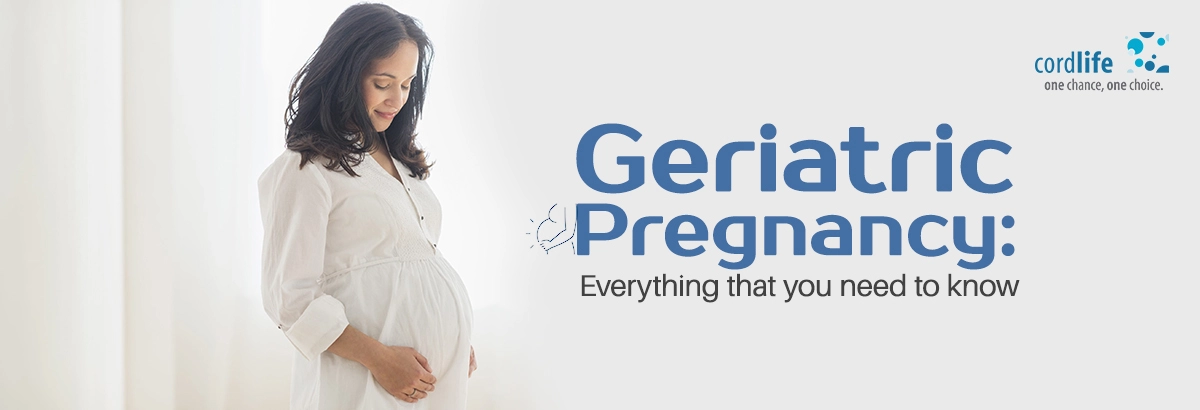Table of Contents
[table_of_contents]
A woman’s peak reproductive age is between the late teens and late 20s. Mostly, by the age of 30, fertility tends to decline. But, many of you wait until later in life – maybe after making a place in your career creating financial stability, or expecting better health behaviour in pregnancy – to plan pregnancy. Moreover, according to the experts from the CDC, being a parent at a later age would be a resource for higher income and better education for your children. Recently, there has been a rise in childbirth after the age of 30 or 35 years old, with the development of science and technology.
So, if you’re planning to become a mother after 30 or 35 years of age, this is something known as Geriatric pregnancy or advanced maternal age.
Pregnancy comes with a lot of challenges, and elderly or geriatric pregnancy comes with benefits and high risks:
What are the Risks of Pregnancy After 35 Years of Age?
Irrespective of the age, every pregnancy comes with a little risk. The risk factors are slightly higher when you’re older, and trying. Your health condition and the health condition of your baby-to-be are associated with ageing. The risks include:
Pregnancy Takes a long
A baby girl is usually born with eggs. As mentioned, the late teens and 20s are ideal times to bear children. However, when you reach the middle of your 30s, the count and quality of eggs decline. After 40, the quality of eggs deteriorates more.
Pregnancy Loss or Miscarriage
A miscarriage takes place on or before the 20th week of pregnancy. A study of 421 201 pregnancies between 2009 and 2013 confirmed that, after the age of 30, or 45, there is a significant rise in pregnancy loss from 10% to 53%.
Preeclampsia
Preeclampsia is a serious form of high blood pressure. When you visit the healthcare practitioner after the 20th week of your pregnancy, he or she will check whether there is the presence of elevated levels of protein in the urine, thus characterised by preeclampsia. With preeclampsia, you’re medically necessitated to give birth via a C-section. You can also expect your baby to be born premature or with a low birth weight.
Gestational Diabetes
Gestational diabetes occurs essentially during pregnancy. Genetic factors, body weight, and the work of the placenta during pregnancy contribute to this health condition. To be elaborate, your pregnancy weight is due to pregnancy diet, and lack of physical activity. Your family history of diabetes matters a lot here. The placenta that forms during pregnancy is responsible for all essential nutrients and oxygen to your developing baby. Simultaneously, the placenta produces hormones that can give rise to insulin resistance. The doctor will take you through a few blood tests around 24 to 28 weeks of your pregnancy to ensure that you have gestational diabetes. If gestational diabetes is left untreated it increases the risk of your giving birth to a premature baby or having a larger-than-average size baby or your baby’s birth may be through a C-section delivery.
Multiple Pregnancies (Twins, triplets, or more)
As a result of maternal age, there is an increased likelihood of twin or multiple pregnancies, with twins accounting for 6.9% of neonates born to women over 40 years of age. Follicle-stimulating hormones play a big role here. FSH is also the hormone responsible for causing an egg to mature in preparation for ovulation each month. Women with elevated FSH levels may have a higher chance of releasing more than one egg in a single cycle.
This aside, the baby you’re giving birth to may be born with birth defects or chromosomal abnormalities.
Do You Think Having a Baby Later in Your Life is All Bad News?
No. Not all. It’s quite natural that you may be worried about your pregnancy, labour and birth as you become pregnant with age. Despite the risks and your age, you’ll be able to enjoy your pregnancy and give birth to a healthy baby. All you need to do is listen to your body and healthcare practitioner. Here’s how that should be:
- Get a trimester-wise checkup done. Trimester-wise vaccines may also be necessitated. Genetic screenings are done to indicate whether the baby onboard has any congenital disease or not. Glucose testing is also done to check the signs of gestational diabetes in the mom-to-be.
- Nutritious, and balanced food is the need of this hour. Don’t forget to include folic acid to prevent birth defects in your baby after they are born. Also, take prenatal vitamins with folic acid.
- Regular exercise can control weight, stress factors, and other medical conditions.
Just don’t miss your appointments. Take care of yourself, and the life you’re nurturing inside you. After all, age is just a number.
